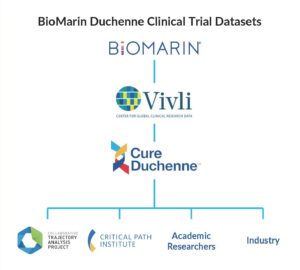
There are more than 7,000 rare diseases and of those 90% are without an FDA-approved treatment. Sharing rare disease data is difficult for a number of reasons, including concerns around protecting patient privacy, control of the data and managing competition, and the possibility for misinterpretation of data. Recently CureDuchenne, Vivli, and the Rare Disease Cures Accelerator-Data and Analytics Platform (RDCA-DAP), an arm of Critical Path institute, were able to come together in partnership to overcome these challenges to be able to unlock the vast potential of a data set for the rare disease Duchenne muscular dystrophy.
CureDuchenne, a venture philanthropy organization that funds research, early diagnosis and treatment access for Duchenne muscular dystrophy, contributed the Biomarin clinical datasets.
Critical Path Institute – RDCA-DAP, is a neutral, independent data collaboration and analytics hub to promote the sharing of critically important data across rare disease in order to accelerate the understanding of disease progression an optimize clinical trial design. A research team from Critical Path’s Duchenne Regulatory Science Consortium (D-RSC) was seeking additional Duchenne datasets that could be used to validate models for regulatory endorsement.
Vivli is a global data sharing platform that facilitated this instance of data sharing of 4 datasets.
D-RSC submitted plans to regulators and received feedback that the data be validated in an EU-based dataset, because data had largely been based in the US. D-RSC recognized that CureDuchenne had access to 4 trials (adding an additional 364 participants and 2,656 observations to the analysis dataset) based in Europe, being shared on Vivli in a secure manner and reached out to both CureDuchenne and Vivli and were provided access to those data sets, completed validation of their models, and are currently awaiting feedback from regulators.
Each of these organizations played a crucial role in advancing outcomes and patient health for those living with Duchenne muscular dystrophy: Vivli’s partnership made it possible for CureDuchenne to maximize the use of the Biomarin clinical trials held by CureDuchenne by managing the data privacy issues and security that are often so difficult in rare disease data sharing, and providing access to that data in a way that maximizes its usefulness and streamlines the process, which in turn facilitated D-RSC to efficiently access this clinical trial data and validate their models.
“In the data sharing world, examples of rare disease sharing are also unfortunately ‘rare’. It is our hope that this case study illuminates how when willing partners come together, perceived obstacles can be overcome. We hope this can serve as a model for others in the rare disease space.” says Vivli’s Executive Director, Rebecca Li.

